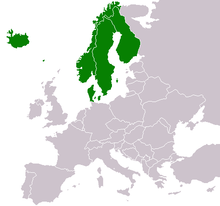Nordic passport union
The Nordic Passport Union is an agreement of the Nordic countries to facilitate cross-border traffic between the participating countries.
The passport union was decided in 1954 as part of a labor market agreement between Denmark (excluding the Faroe Islands and Greenland ), Sweden , Finland and Norway . Iceland joined the Union on December 1, 1955, and the Faroe Islands on January 1, 1966. The aim was to enable workers to move back and forth between countries more easily, thereby reducing staff shortages and unemployment. The labor market agreement, the passport union and a social agreement concluded in 1955 made it easier for foreign workers to make a fresh start in many areas. In contrast to citizens from non-Nordic countries, it was easier for them to obtain a residence permit and their social security was also ensured. From 1981 they were allowed to participate in local elections after receiving their residence permit. In the meantime, a residence permit is no longer necessary for citizens from Nordic countries. Only registration with the authorities is required.
On May 1, 1958, the abolition of border controls finally came into force, with the elimination of passports for cross-border traffic between the participating states in 1952. Denmark, Sweden, Finland and Norway have been involved in this measure from the start. Iceland followed on September 24, 1965, the Faroe Islands on January 1, 1966 when they joined the passport union. Greenland and the Norwegian islands of Spitzbergen (Svalbard) and Jan Mayen were not part of this initiative.
With the accession of the EU members Denmark, Sweden and Finland to the Schengen Agreement , border controls at the EU external border with Norway with Sweden and Finland as well as in the Danish, Swedish and Finnish airports and seaports would have had to be reintroduced before traveling to Norway or Iceland . Therefore, on May 18, 1999, Norway and Iceland signed an agreement to participate in the Schengen system. The provisions of the agreement on the accession of Denmark to the Schengen Agreement did not apply to the Faroe Islands and Greenland. The two “equal nations” in the Kingdom of Denmark, however, also forego border controls due to a cooperation agreement.
literature
- David Phillips, Hubert Ertl: Implementing European Union Education and Training Policy: A Comparative Study of Issues in Four Member States. Springer, 2003, ISBN 978-1-4020-1292-1
- Friedrich Heckmann, Dominique Schnapper: The Integration of Immigrants in European Societies: National differences and Trends of Convergence. Lucius & Lucius, Stuttgart 2003, ISBN 978-3-8282-0181-1
Individual evidence
- ↑ Information about the conditions on the Nordic Council website (Nordic languages and English)
- ↑ Relations with Iceland and Norway ( Memento of the original from May 27, 2007 in the Internet Archive ) Info: The archive link was automatically inserted and not yet checked. Please check the original and archive link according to the instructions and then remove this notice.
- ↑ Agreement on the Accession of the Kingdom of Denmark ( Memento of January 2, 2014 in the Internet Archive )
